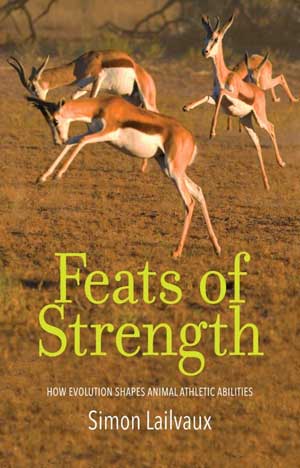
This book is about the often amazing athletic abilities that animals possess. It aims to explain how and why evolution has equipped certain animals with the capacity to do things like climb waterfalls with their jaws, run across the surface of the water without sinking, or shoot water bubbles at potential prey. As strange as some of these things are, they are all explicable according to the rules of mechanics, physics, and physiology, and they happen because they help the animals that possess these strengths to survive and reproduce in the face of their specific challenges.
I suppose one feature of this book that is a bit different is the style. I read popular science books to learn cool stuff about science, and I am sometimes annoyed by the intrusion of too many personal stories and narratives into the proceedings. There’s nothing wrong with that approach, and it is very effective when done well, but it isn’t to my taste and nor is it one of my strengths. The challenge then was to make this book entertaining, fun to read, and not at all like a textbook without relying overmuch on storytelling. I think I ultimately produced something that explains the exciting and compelling science involving performance but that isn’t self-important or dry. I wouldn’t call it “moist,” because nobody likes that word, but maybe it’s “humid.” Or “sultry.” (Both of those are bad. You’re going to edit this so that nobody finds out I described my book as “humid,” right? Cool.)
I also thought it was important to point out the many things that we don’t know, or instances where we understand something only poorly. Nonscientists often view contradictory results or corrections to previous findings with suspicion. In fact, making sense of those contradictions and fixing the flaws in our understanding is how science works! Scientists are far more comfortable with uncertainty than one might suspect, and I think it’s important to note that there are certain areas and subjects that we just don’t know much about, and that’s OK. As someone almost definitely probably already said, the first step towards learning is knowing what you don’t know.
I’d recommend the reader read this book in the normal way: in public at 10am on a Wednesday whilst drinking a daiquiri and dressed as a clown. (I should probably note that it’s Mardi Gras here in New Orleans right now so my sense of “normal” might be a bit off.)
Even more than it is about performance, this book is about evolution. What really draws me to performance is how central it is to a variety of areas in evolutionary biology, from sexual selection to life-history and sexual conflict. It relates directly to several big questions that evolutionary biologists are keenly interested in: for example, what makes males attractive to females? How do traits respond to selection when they are linked to several others in complex ways?
One can study performance from so many different angles and perspectives that it allows the creative researcher to explore and make connections among areas of ecology and evolution that on the face of it might appear to have little to do with each other. This is the approach that I take with my research, and it is the same approach that I’ve applied to writing this book. So, in many ways, this book is really a crash course in evolutionary ecology – at least, those parts of it that most interest me and to which performance is most relevant. It may seem to some that my research program resembles the work of a conspiracy theorist who sees connections everywhere, but that’s just because they’re all out to get me.
I’ve written several academic reviews in the past on various performance related topics, and I’ve always enjoyed that process. Good reviews are tough to write, but very rewarding when you’re able to point to some new way forward. I wanted to write something more substantial that would reflect my personal perspective on the interconnectedness of all performance things, but that makes those links clear and explicit. I also wanted to have something that I can point to the next time someone asks me how making lizards run on racetracks could possibly be a real job…
I would hope that readers encounter the last chapter, preferably because they got there through first reading the preceding nine chapters, but I’m not picky. That last chapter is mostly about humans, and specifically it is about how we can apply what we’ve learned about animal performance to understand our own evolutionary history. That emerging body of research is as good an argument as I’ve seen for why we should conduct basic research, and it is startling how relevant basic performance work is to humans once you adopt the perspective that humans are just another peculiar species of animal (which, of course, we are). Failing that, page 127 is a terrific page that explains why you either should or shouldn’t watch the Sylvester Stallone movie Over the Top, depending on how much you like terrible movies. If referencing a ridiculous action movie from more than 30 years ago doesn’t bring in the young people, then I don’t know what will!
I’d also like to briefly answer a question that you didn’t pose to me, and that is “Is there anything that you really wanted to include in the book but weren’t able to?” Yes, there is, and I’m glad I asked myself that. I describe at one point an experiment performed in 1958 by a researcher named Raymond Cowles that involved dressing lizards in tiny bespoke mink coats. The idea was to test some hypotheses about why modern reptiles aren’t covered with insulating furs or feathers. Cowles actually took a picture of these fashionably dressed lizards, and it is glorious. The great performance researcher Ray Huey told me that Cowles had given that picture to him, and Ray in turn later passed it on to yet another scientist, Warren Porter. But although Warren was extremely gracious and helpful, he doesn’t know what happened to the picture. He did direct me to the only known reproduction and gave me permission to use it but unfortunately it wasn’t of high enough quality to be included in the book. Still, somewhere out there is a picture from 1958 of a lizard in a little fur coat (for science!), and that makes me happy.
I wrote this book in such a way that it is (hopefully) accessible to anyone with an interest in evolution, the animal world, or terrible Sylvester Stallone movies. Having said that, I did have a potential target audience in mind, and that is students who are considering or actively embarking upon graduate studies in ecology and evolution. There is more opportunity than ever to do really interesting and integrative research on performance and all of the areas that performance intersects with, and I would be pleased indeed if something in my book sparks the imagination of a young scientist searching for a dissertation topic. I even rigged the odds of this happening in my favor. Over the years I have filled a notebook with ideas for research projects that I will likely never get around to executing. Many of those ideas are dreadful, but several of the more lucid ones made their way into this book. So, there you have it: if you are interested in research questions that another scientist you’ve never heard of hasn’t bothered to follow up on, this book is for you!
However, I also very much hope that anyone who reads it, regardless of their background, goals, or interests, learns a little bit more about the natural world, about evolution, and about how and why we do science. It’s difficult to write something that will appeal to more than one audience, so in the end I just wrote something that appeals to me. I’m happy to say, this it does, even though all I can see when I open it now are problems and things I could have done better. With any luck, nobody else will notice them!


Simon Lailvaux is the Virginia Kock/Audubon Nature Institute Chair in Species Preservation at the University of New Orleans. He was born in Harare, Zimbabwe, educated in South Africa, and earned graduate degrees from the University of the Witwatersrand and Tulane University. His research group investigates ecological and evolutionary phenomena related to animal performance. He lives in New Orleans.